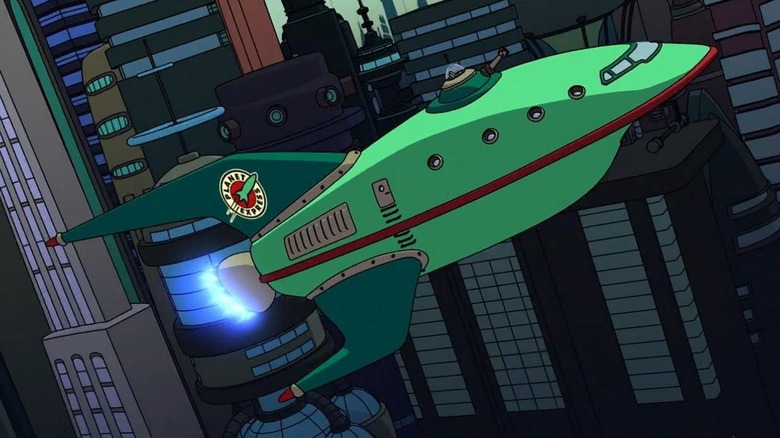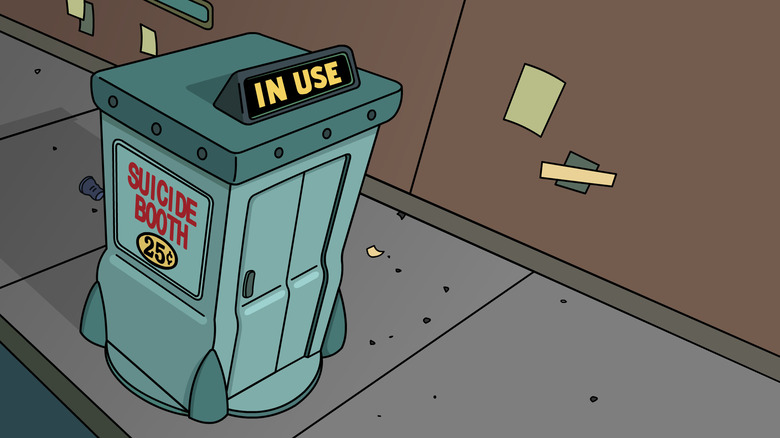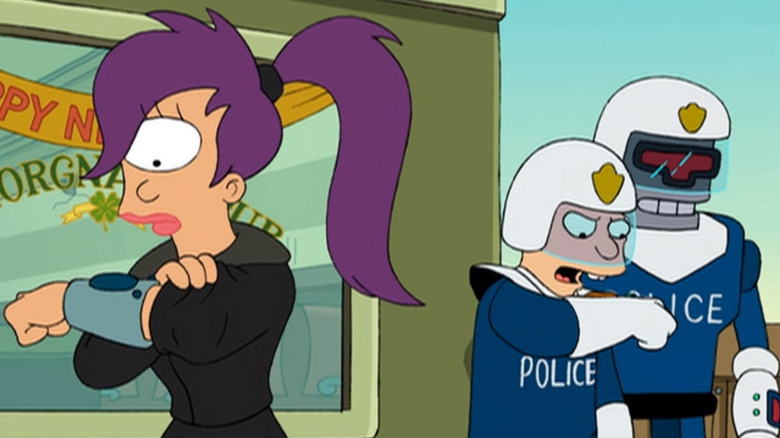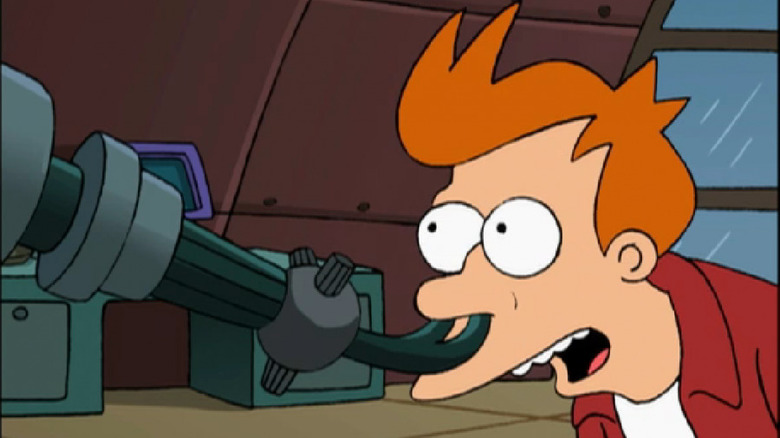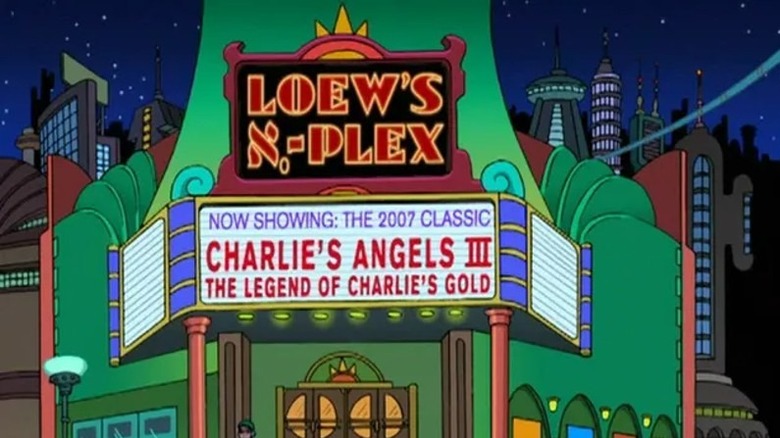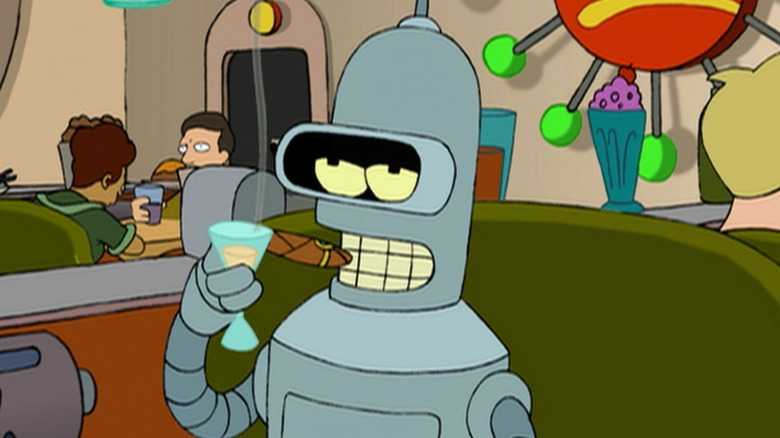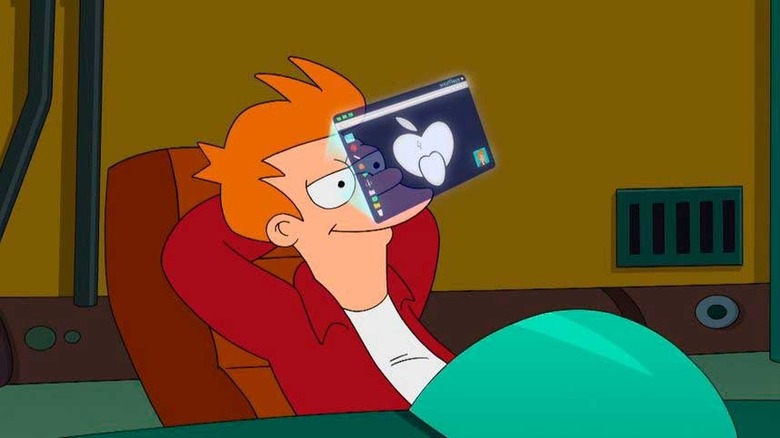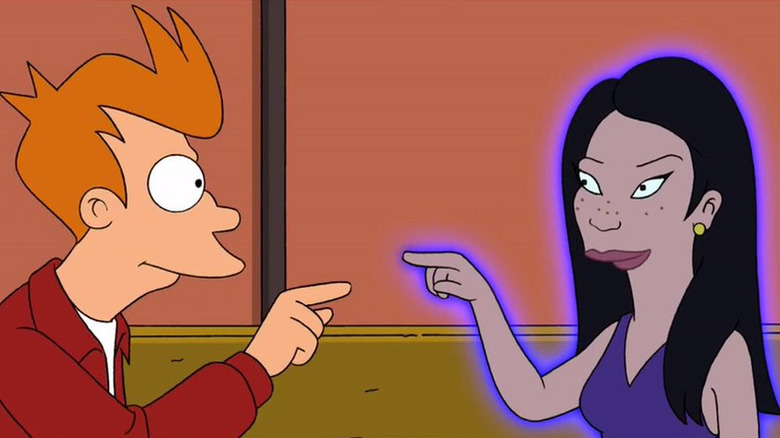Every Time Futurama Predicted The Future
Matt Gorening's and David X. Cohen's "Futurama," soon to be rebooted for the third or fourth time, was never meant to be speculative science fiction along the lines of, say "Star Trek." The show begins with the hapless twentysomething dimwit Philip J. Fry (Billy West) accidentally getting cryogenically frozen for a millennium, waking in the year 3000. In the future, he becomes friends with an alcoholic robot named Bender (John DiMaggio) and a badass cyclops pilot named Leela (Katey Sagal), and the three of them take blue collar jobs at a low-rent delivery company called Planet Express, run by the doddering old mad scientist Professor Farnsworth (also West).
The show is rife with references to well-established sci-fi tropes and TV shows (the blowhard character of Zapp Brannigan is meant to emulate William Shatner, for instance), as well as any number of scientific and math references (the writers' room was well stocked with holders of advanced degrees). It was a show made by alpha nerds to appeal to other alpha nerds, just with a few raunchy ass jokes thrown in. While the universe of "Futurama" would become increasingly complex over its multiple seasons and movies (Richard Nixon's resurrected severed head is the president of Earth, starships run on dark matter harvested from the colons of Nibblonians, the word "ax" will come to replace the word "ask," every installment of "Star Trek" will be banned because of a Holy War), its dalliances with technological prognostication rarely stretched beyond a few fun coincidences.
But some of those fun coincidences did indeed come true as seen in the below list. Tune up your holophoner. It's time to start.
Suicide booths
One of the introductory details of "Futurama," and one that gave the studio pause when Groening pitched it, was that in the year 3000 suicide booths would be located on every corner. The implication is that modern life has become so intolerable that euthanasia became a coin-operated industry. The show's suicide booths were often played for quick bursts of gallows humor, a cynical running gag left over from grimmer '90s sensibilities. Over the years, fans of "Futurama" would note that the writers began employing them less and less (although they do still pop up from time to time).
However, the writers were recently validated: In December of 2021, a sleek, specialized euthanasia pod had been invented in Switzerland. The pod is an airtight chamber wherein the user would be sealed in, and their air supply rapidly (over the course of 10 minutes) replaced by nitrogen until suffocation occurs. It's worth noting that euthanasia is legal in Switzerland, only one of seven countries worldwide that expressly allow the practice. It is also legal in eight of the United States.
There are no coin-op euthanasia machines on street corners, but something that was started as a grim "Futurama" gag has now seen reality.
The Wrist LoJack-a-mater
"Futurama" is hardly the first piece of fantasy or sci-fi that included a wrist-mounted communication device. Indeed, the two-way wrist radio was one of Dick Tracy's greatest superpowers back in 1931. Leela's wrist-mounted widget, which she once called the Wrist LoJack-a-mator, was used as a two-way radio, a screen for "Pong" and "Tetris," a scanner (akin to the tricorder on "Star Trek"), and a surgery laser. It was also used for video calls and whatever else the writers needed it for in any given moment.
Modern wrist-mounted devices became more common after the inception of "Futurama," with Apple, Samsung, and others inventing their own "smartwatches" that tie into your cellular phone, and deliver texts, health information (such devices are often used to regulate workout routines), and news headlines. Modern smartwatch devices don't quite do everything that Leela's Wrist LoJack-a-mator might do — no surgery lasers yet — but they do more than Dick Tracy could have ever dreamed.
The smelloscope
Located in the tower of the Planet Express building is Professor Farnsworth's most-used invention, the smelloscope. In the future of "Futurama," it is revealed that each heavenly body has its own unique aroma, and Farnsworth had found a way to detect said smells from lightyears away. And while one can't breathe in space particles to actually get a whiff of the cosmos, some scientists have theorized what space might smell like judging by the many particles in the eternal vacuum.
How the smelloscope actually works is never explained in "Futurama," but the operations of a field olfactometer called the Nasal Ranger are ready to be studied for the adenoidally curious. Olfactometers have a variety of uses, including sniffing out gas leaks or detecting sewer damage. The funnel-shaped device is fitted over the nose, and one can take a deep breath in to sniff something far away that has been enhanced by the meter's chemical workings. To date, olfactometers are not used for spatial detection, but surely that is mere steps away.
Choose-Your-Own-Adventure movies
Throughout "Futurama," the main characters go to see movies at their local Loew's א0-plex. When Fry sees his first 31st-century movie, he is surprised to learn that the movie stops every few minutes to conduct an audience poll as to where the story should go next. The disembodied voice leading the polls is played by Russ Leatherman, the once-ubiquitous voice behind the call-in movie times service Moviefone. The choices in "Futurama" are fraught, and audiences can choose between watching an action sequence, or a scene wherein the characters do their taxes.
Interactive movies have become increasingly common over the years, and many modern video games have come to resemble films with minor control elements throughout. In 2018, Eko published an interactive sequel to the 1983 computer thriller "WarGames" called simply "#WarGames," wherein a viewer could choose which screen to watch of a cluster of conversing characters. The narrative would change depending on which one you were watching. Something similar was done on the short-lived streaming service Quibi in 2020 with their film "Wireless," which let viewers watch an actor in a car or what was on the character's phone, depending on how the viewer oriented their phone screen. There was also the Netflix film "Bandersnatch," the feature film adaptation of "Black Mirror," which also polled viewers as to which path they wanted the movie to take. This approach was also tried by Netflix' "Captain Underpants" series, as well as other kid-friendly shows.
Alcohol as fuel
Bender Bending Rodriguez is, true to his name, a bender. He can bend metal. It's why he was built. Also true to his name, Bender is an alcoholic, as are all robots in the future. It turns out that booze helps keep robots' fuel cells charged, and they have to keep on drinking all day in order to prevent powering down. If they drink too much, they get drunk. If they drink too little ... they also get drunk. The future is a world of crazed, lazy, drunken robots. Either stay indoors, or live like it's Carnival in Rio.
There are no alcohol-fueled robots yet, but using alcohol as fuel is a very real thing. In New Zealand, some scientists have pioneered something they are referring to as "brewtroleum," which uses the excess yeast and grain left over from the beer brewing process and converting it into an ultra-refined ethanol (which, sadly, must be blended with actual gasoline — it's more of a supplement). It's not exactly a clean-burning alternative to ordinary oil-based petroleum, but it's cleaner to manufacture.
The eyePhone
In a 2010 episode of "Futurama," the entire world becomes briefly obsessed with a hip new smart device called an eyePhone (a clear model on the real-world device we all still use each and every day, the Zune). The eyePhone was inserted (painfully) into the user's eye socket, right next to their eyeball, and allowed people to watch a video screen projected midair directly in front of their faces. It also used the eyeballs as camera lenses and would record anything the user looked at. So much of sci-fi has now incorporated the (aesthetically ugly, horrendous to ponder) floating video screen notion to their tools, it seemed to be the logical next step in ordinary consumer products.
Thanks to Samsung, such a device is now in development. Not a painful widget crammed next to one's eyeballs, but a contact lens with recording abilities, controlled by blinking. The idea is to fill a user's field of vision with augmented information — the way ancillary scanning data fills The Terminator's eyes — and can take pictures of whatever they blink at. Patents for such tech go back to 2014 and nothing has been made available to the consuming public, but a computerized contact lens is certainly in our future, and would be far less unwieldy than Google Glass.
Sex robots
It is illegal for humans to date robots in "Futurama," as having a programmable sex celebrity at your beck and call 24 hours a day would be so alluring as to cease human progress entirely. Regardless, Fry finds a way to create a robot girlfriend modeled after actress Lucy Liu (playing herself), disgusting his co-workers. Fry eventually has to break up with his Lucy Liu-bot when he learns that celebrity robot clones are made by torturously shocking the preserved, still-living heads of the actual celebrity. The episode climaxes with an army of Lucy Liu robots engaged in battle.
While sex dolls are nothing new — RealDoll has been in business since 1996 — functioning robotic sexual partners are closer to being a reality all the time. A company called Realbotix has already developed a customizable robot bust with a realistic face and speech, based on yourself. Famously, comedienne Whitney Cummings had one made of herself and incorporated it into a bit of hers. It's only a matter of time before RealDoll and Realbotix are working together to make a fully customizable companion.
Perhaps more darkly, "Futurama" also leaned in the direction of deepfake technology, sometimes used to — with increasing realism — insert celebrity's faces into pornographic films. It's not the same as a robot, but it does explore the idea of stealing a celebrity's likeness for your own gratification and without their permission. The law has yet to catch all the way up with this kind of tech.
